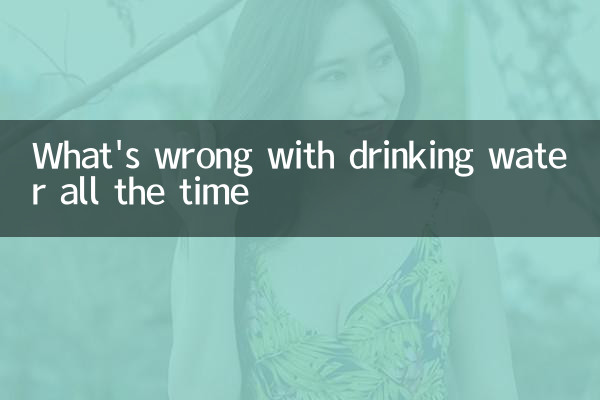What's wrong with drinking water all the time
In the past 10 days, the discussion on "always drinking water" on the Internet has remained high, and many people wonder why they often feel thirsty or need a lot of water. This article will combine recent hot topics and scientific analysis to answer the possible reasons behind this phenomenon and provide structured data for reference.
1. Discussions related to "Always Drinking Water" in recent hot topics

| Ranking | topic | Popularity index | Main discussion points |
|---|---|---|---|
| 1 | Early symptoms of diabetes | 9.2 | Is it a sign of diabetes if you drink more than urine |
| 2 | High temperature hydration in summer | 8.7 | How to replenish water scientifically to avoid water poisoning |
| 3 | Sjogren's syndrome | 7.5 | Symptoms of dry mouth caused by autoimmune diseases |
| 4 | Misconceptions about hydration after exercise | 6.8 | Excessive drinking water can harm health |
| 5 | Psychological thirst | 6.3 | Drinking behavior caused by anxiety |
2. Analysis of common reasons for always drinking water
According to recent interviews with medical experts and popular science content in health accounts, drinking water can be caused by the following factors:
| Cause Type | Specific performance | Related inspection suggestions |
|---|---|---|
| Physiological factors | High temperature environment, strenuous exercise, high-salt diet | Observe the improvement of symptoms after environmental changes |
| Pathological factors | Diabetes, diabetes insipidus, thyroid problems | Blood sugar test, thyroid function test |
| Drug Factors | Side effects of diuretics, antidepressants, etc. | Re-examination drug list |
| Psychological factors | Anxiety, compulsive drinking behavior | Psychological Assessment Scale |
3. Analysis of recent hot search cases
1."A girl born in the 2000s has diagnosed diabetes insipidus by drinking 4 liters of water on her birthday"The topic (230 million views) has attracted attention to rare diseases. Medical blogger @Health Compass pointed out that patients with central diabetes insipidus can have a daily urine output of 5-10 liters, and they need to be confirmed through a water contraindication test.
2.#Is electrolyte water IQ tax?Among the topics (180 million views), nutrition experts recommend that the general population does not need to deliberately replenish electrolyte water unless there is a lot of sweating or diarrhea.
3. Fitness expert @Coach Li’s “Sports Hydrating Timeline” video (5.8 million views) reminds: The hydration should not exceed 800ml per hour to avoid hyponatremia.
4. Scientific drinking water suggestions
| crowd | Recommended daily water drinking | Things to note |
|---|---|---|
| Healthy Adults | 1500-2000ml | Contains moisture in food |
| High temperature operator | 2000-3000ml | Replenish electrolyte-containing beverages in batches |
| Diabetic patients | Adjust as doctor's instructions | Monitor blood sugar control |
| People with abnormal kidney function | Strictly limited quantity | Individualized solution required |
5. When do you need medical treatment?
According to the recent interviews by chief physician of the Department of Endocrinology at Grade A Hospital, it is recommended to seek medical treatment in a timely manner if the following situations occur:
1. Daily water consumption lasts more than 3 liters and is accompanied by polyuria
2. Wake up frequently at night due to thirst and drink water
3. Still feeling extremely dry mouth after drinking water
4. The weight drops significantly in the short term
Experts specifically remind: In recent times, under high temperatures in many places, it is necessary to distinguish between normal hydration and pathological drinking. If the symptoms do not improve after adjusting the ambient temperature, or other accompanying symptoms appear, basic examinations such as blood sugar and urine should be performed in a timely manner.
Conclusion:Always drinking water may be a health signal from the body, and there is no need to panic too much or ignore it completely. Combining the recent weather characteristics and comprehensive judgment of one's own situation and seeking professional medical help when necessary is the scientific response.

check the details

check the details